Search the Special Collections and Archives Portal
Search Results
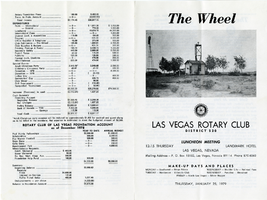
The Wheel Las Vegas Rotary Club newsletter, January 25, 1979
Date
Archival Collection
Description
Text
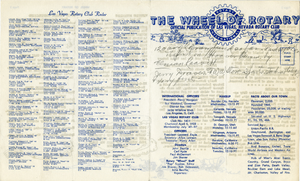
The Wheel of Rotary Las Vegas Rotary Club newsletter, October 27, 1949
Date
Archival Collection
Description
Text
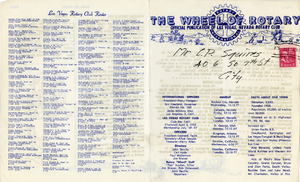
The Wheel of Rotary Las Vegas Rotary Club newsletter, February 2, 1950
Date
Archival Collection
Description
Text
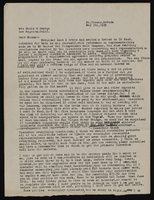
Correspondence, Levi Syphus to Sadie George
Date
Archival Collection
Description
Text

Sanje Sedera oral history interview: transcript
Date
Archival Collection
Description
Oral history interview with Sanje Sedera conducted by Kristel Peralta, Cecilia Winchell, Ayrton Yamaguchi, and Stefani Evans on April 16, 2021 for Reflections: The Las Vegas Asian American and Pacific Islander Oral History Project. Sanje Sedera discusses growing up in Sri Lanka, formerly Ceylon, with his family. He shares his educational history, moving from Sri Lanka to Darwin, Northern Territory, Australia as a high schooler to learn English before immigrating to the United States to attend Idaho State University. Sedera discusses the political unrest and civil war that took place in Sri Lanka between the Tamil and Sinhalese people, and how he grew to appreciate political activism instilled in him by his paternal grandparents. Sedera shares his employment history working as a manager for K-Mart, an opportunity that brought him to Las Vegas, as well as his entrepreneurial pursuits of owning a mortgage business and becoming a realtor. He talks about the financial crisis of 2008 that led to losing his business, his attempts to run for public office, and how he helped to form Nevada's Asian American Democratic Caucus. Sedera concludes with a discussion of his Buddhist practice and how these philosophies have shaped his life.
Text

Casiano Corpus Jr. oral history interview: transcript
Date
Archival Collection
Description
Oral history interview with Casiano Corpus Jr. conducted by Cecilia Winchell and Stefani Evans on February 14, 2023 for the Reflections: the Las Vegas Asian American and Pacific Islander Oral History Project. In this interview, Corpus Jr. details a difficult childhood in the Philippines, where society is highly socioeconomically stratified. He recalls his parents working a number of jobs to support their large family, and as soon as he finished his primary schooling, he also started working in construction. When his father was finally petitioned by his uncle to move to the United States, Corpus was at first reluctant to go, since he had a familiar life in the Philippines, but has come to love the United States and the life he created for himself. Immediately after moving to the United States, their family landed in Las Vegas, Nevada, and Corpus began working a number of jobs. He started out as a busboy at a Chinese restaurant before deciding that he wanted to work in a casino and moved to Union Plaza. His current job is as a porter at Palace Station, where he has been for the past 31 years. He has also been working to unionize Palace Station and Station casinos with the Culinary Union for the past twelve years. He talks about the hunger strike he organized, why he organizes with no fear, and what he hopes to see out of his efforts throughout the interview.
Text
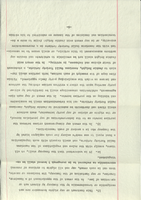

Angela Castro oral history interview: transcript
Date
Archival Collection
Description
Oral history interview with Angela Castro conducted by Stefani Evans, Cecilia Winchell, Kristel Peralta, Vanessa Concepcion, and Ayrton Yamaguchi on November 05, 2020 for the Reflections: The Las Vegas Asian American and Pacific Islander Oral History Project. Castro begins the interview by talking about her early life, childhood, what Guam was like, and the history of her parents and grandparents. She describes the difference in public and private education in Guam and compares it to the United States. She explains the reason why she moved to Las Vegas, Nevada in 1998 and attended the University of Nevada, Las Vegas for public relations. Castro then talks about the differences between older and newer generations, the political atmosphere in Guam, and the differences between the United States and Guam in politics. She also talks about the discrimination she has experienced throughout her life and diversity in the workplace. Lastly, she describes her culture and traditions during holidays, the struggles with an absence of culture within her family, and her personal religious beliefs.
Text

Interview with Charles McWilliam, July 9, 2004
Date
Archival Collection
Description
Text

Transcript of interview with Alfred "Al" Isola by Stephen Kalish, March 15, 1976
Date
Archival Collection
Description
On March 15, 1976, Stephen Kalish interviewed Alfred “Al” Isola (born August 3rd, 1917 in Oakland, California) in his office about his garbage company and early Southern Nevada. The two discuss Las Vegas’ lack of a unified garbage system and how dumping sites have had to adjust their practices in order to limit their impact on pollution. Isola also explains the different disposal protocols for wet and dry trash. On the second tape of the interview, an unidentified woman enters the conversation.
Text
